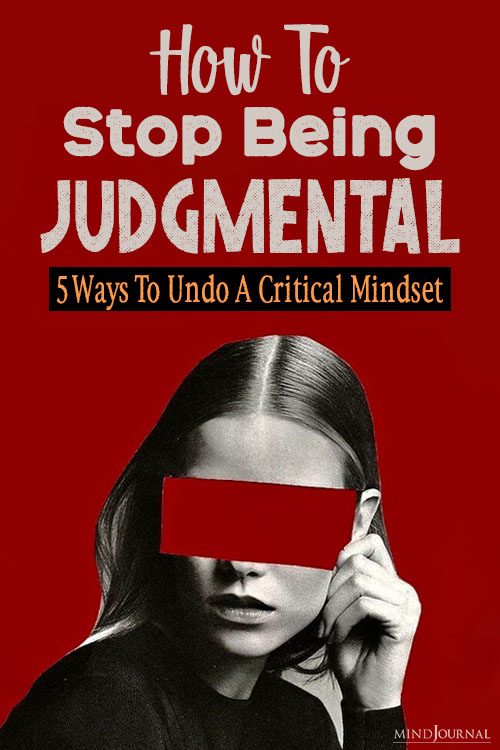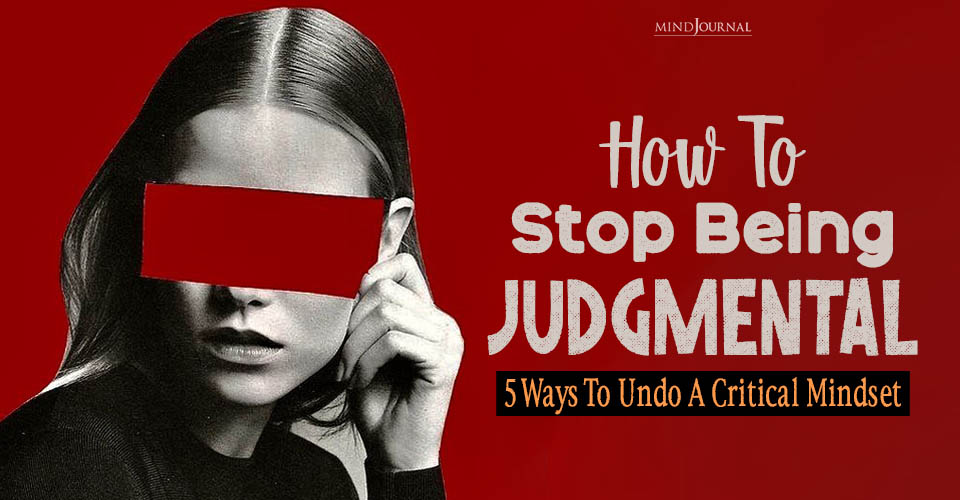Here’s the deal: learning how to stop being judgmental isn’t just about being nice; it’s about freeing yourself from a critical mindset that holds you back. If you’ve been looking for ways to stop judging others (and yourself), these five tips will help you chill out and see the world through a kinder lens. Let’s find out what you can do to stop being critical!
KEY POINTS
- Judging others doesn’t just harm our relationships—it also takes a toll on our mental health.
- Minimizing our judgments and critical thoughts of others is something everyone can work on.
- Science-based tips include controlling biases, practicing empathy, and reducing consumption of social media.
If we’ve learned anything from the chaotic minefield that is Twitter (now “X”), the endless scroll of TikTok, and the soap opera of political news, it’s that people are in a judging mood.
From what you wear to the way you chew, we’re constantly forming snap judgments about the people around us.
But here’s the deal: Judging others doesn’t just harm our relationships—it also takes a toll on our mental health. Plus, it can create an “us vs. them” mentality that only divides us further, especially in an already polarized world.
So, how can we stop being so judgmental and start being a bit more empathetic? Here are five ways to put the gavel down.
Related: 4 Effective Ways To Deal With Judgment And Judgemental People
How To Stop Being Judgmental? 5 Ways to Undo a Critical Mindset
1. Check your own biases.
Everyone has biases—even you. (I do as well, I’m told.) These biases are sneaky little creatures that affect how you see the world. They’re shaped by your background, experiences, and that 24/7 news algorithm we can’t seem to escape.
Thus, when you judge someone, you’re often reacting based on assumptions or stereotypes rather than the full picture. Take a second to pause. Ask yourself: “Is my judgment really about them, or am I reacting to something inside of me?”
For example, when you scoff at someone’s career choice (like deciding to be a full-time influencer, telemarketer, or reality TV star), is it because you genuinely think it’s a bad career—or could you secretly be a little envious of their confidence?
Be honest—self-awareness is the first step to cutting the judgmental habit.

2. Reframe your perspective.
Reframing the way we view people’s choices can help us realize they’re just navigating life based on their experiences and circumstances. Their goals are different from yours. So before you make a judgment call, remember that you’re not playing the same game.
If you’re not living someone’s life, you have no idea what’s going on behind the scenes. What looks like a hot mess to you might be someone else’s careful balancing act.
Think about it—when we see billionaires like Elon Musk launch daily tweets proclaiming his alpha bro status or cultural curiosities like Kim Kardashian going on about business ventures, it’s easy to judge them for their decisions.
But what if we turned it around? Maybe Musk is dealing with “rich-person stress” that we can’t relate to. Maybe Kim is working twice as hard as people think to juggle a billion-dollar empire and raise four kids. I don’t know. Maybe. Could be.
3. Practice empathy.
Empathy isn’t just for therapists and kindergarten teachers—it’s a skill everyone can develop. Think of empathy as your mental gym membership. The more you use it, the stronger it gets.
So the next time you find yourself judging someone for their parenting style, the way they dress, or their political views, take a step back and imagine yourself in their shoes. What pressures are they facing? What experiences shaped their choices?
This doesn’t mean you have to agree with everyone (please don’t). But empathy allows you to understand that there’s more to people than meets the eye.
In fact, practicing empathy has been shown to strengthen social connections and improve emotional regulation. So next time, channel your inner Ted Lasso and lead with kindness.
Related: What Is All Or Nothing Thinking? How To Break Free From A Rigid Mindset
4. Stop scrolling and start living.
Social media is a breeding ground for judgment. How many times have you scrolled through Instagram or TikTok and thought, “Oh, sure, Karen. Gold on toast? Must be nice to have a trust fund, huh?” or “You cannot organize a spice rack that way, how dare you!”
Social media, with its curated and filtered versions of reality, invites us to compare and critique. The more time you spend online, the more judgmental you’re likely to become.
One way to combat this is by taking regular breaks from social media. Step out of the digital echo chamber and engage with people face-to-face.
You’ll notice that when you have actual conversations, it’s harder to reduce someone to a meme or a snarky comment. Plus, it’s a lot easier to be kind when you’re not competing for likes or retweets.

5. Cultivate curiosity and replace judgment with wonder.
One of the most powerful tools for reducing judgment is curiosity. Instead of jumping to conclusions, ask questions, whether mentally or out loud.
Why does that person have a different opinion from yours? What experiences led them to their current worldview? Why does that person dress the way they do? Curiosity opens the door to deeper understanding, while judgment slams it shut.
It’s like streaming a new show—if you stop after five minutes, you’ll never understand why the characters act the way they do. The same goes for people. Everyone has a backstory, and sometimes it’s more surprising (or heartwarming) than you’d expect.
Plus, cultivating curiosity keeps your brain flexible, which is a win for your overall mental health.
Conclusion
The world would be a far better place if we spent less time judging others and more time understanding them. Judgment alienates and isolates, while curiosity and empathy connect us.
Related: 10 Signs You Are An Independent Thinker
Whether it’s a friend, a stranger on the subway, or a celebrity trending on Twitter, remind yourself that everyone has a story. So stop being so judgmental, and start being a little more curious. Your relationships—and your peace of mind—will thank you for it.
© Kevin Bennett, Ph.D., 2024.
For more, check out Dr. Bennett’s TikTok @KevinBennettPhD and his podcast on danger, deception, and desire kevinbennettissnarling.buzzsprout.com
Written By Kevin Bennett Ph.D.
Originally Appeared On Psychology Today










Leave a Reply